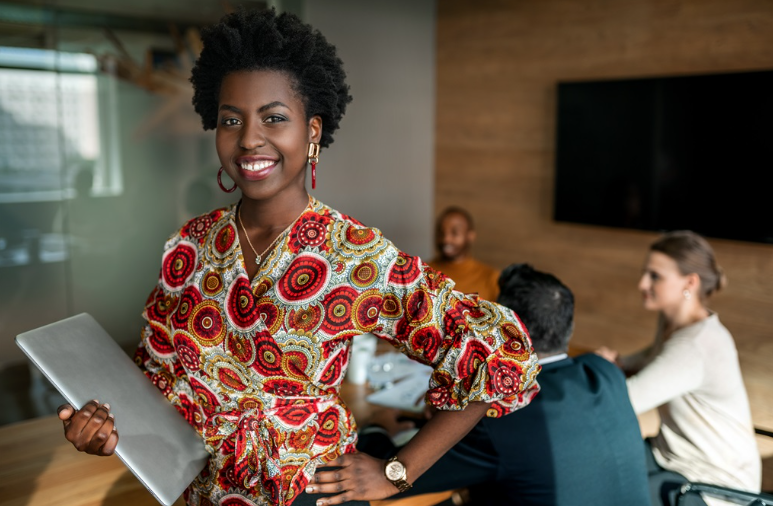Let's Talk Human Rights

2023 Summer Fellowship: Studying Africa's Economy with GTI-U
By Ndeye Aminata D. Thiome 23'
Entrepreneurship is a burgeoning global phenomenon and its importance is recognized in modern business practices, as the entrepreneur is the single most important player in a modern economy. (Bubou, G. M., Siyanbola, W. O., Ekperiware, M. C., & Gumus , S., 2014) The Global Entrepreneurship Monitor (GEM) hypothesized that the entrepreneurship conditions in a region will stimulate every entrepreneurial activity which in turn stimulates regional economic growth (ibid) This, according to the Organization for Economic Cooperation and Development (OECD), is because entrepreneurship has great potential for creating jobs and reducing unemployment, not just in the population in general, but also among people who are vulnerable to social exclusion. (ibid) The continent of Africa has a bright economic future ahead, but this fact can be hindered by the lack of opportunity and support for women in entrepreneurship. Half of Africa’s potential is held by African women. African women not only have the social skills to place Africa forward, but they also have the intelligence and work ethic to boost Africa’s overall economy.
Socio-cultural biases play a big role in preventing women from successfully competing against men for senior roles in digital companies (Seetharaman, 2017).(Adeola, O., 2020) The GPS for women’s labor-force participation is 0.76—denoting medium gender inequality—whereas the global average is 0.64 or high gender inequality. (ibid) Africa’s female participation is roughly on a par with that of China, Eastern Europe and Central Asia, North America and Oceania, and Western Europe. (ibid) However, most African women work in low-paid, often subsistence, jobs in the informal economy. (ibid) In addition, market-related factors such as the paucity of investment and installation infrastructures affect women disproportionately (UN Statistics, 2016). (ibid)
In the formal economy, Africa has made notable advances on getting more women into executive committees and board positions. (ibid) Africa has the highest female representation at the board level of any region at 25 percent against a global average of 17 percent and marginally higher than average representation on executive committees at 22 percent. (ibid) Nevertheless, Africa’s GPS on women in leadership positions—which includes top and middle-management positions—is still only 0.33, a little below the global average of 0.37. (ibid) Since 2015, progress on increasing women’s presence in middle-management roles has gone backward—on average across Africa by around 1 percent a year. (ibid) In North Africa, only 9 percent of women attain middle-management roles despite the fact that they account for 53 percent of the population completing tertiary education. (ibid) Too few African women make it into high-quality professional and technical jobs.(ibid) The implication of the slow pace of achieving gender equality in Africa, for instance, will elongate Africa’s expected time for economic prosperity, growth and development across all sectors.(ibid) Gender inequality in Africa remains high, and progress toward gender parity has stagnated According to the 2014 GSMA Connected Women Survey, the percentage of African women holding senior positions in the mobile communications industry is 9 per cent (GSMA & ATKearny, 2015). (ibid)
Although the overall picture is one of stagnation or even reversals in the journey toward parity, some countries have shown remarkable improvement on some indicators. (ibid) For instance, Rwanda and South Africa have increased women’s representation in middle-management roles by 27 percent and 15 percent, respectively. Algeria has cut maternal mortality rates by around 9 percent. (ibid) Egypt has tripled its score, and Guinea and Liberia doubled their scores on legal protection of women.(ibid) These examples of rapid progress should inspire others to forge ahead with actions to advance gender equality. (ibid)
Africa has so much promise; the continent is home to some of the world’s fastest growing economies and offers an exciting frontier for businesses looking for growth and new markets and yet, persistent gender inequality is limiting its potential. (Moodley, L., Kuyoro, M., Holt, T., Leke, A., Madgavkar, A., Krishnan, M., & Akintayo, F., 2019) Pockets of good news do exist, but they tend to be success stories for women at the top of the pyramid, but not for millions of ordinary African women. (ibid) Because of the failure to embrace gender diversity, millions of women and Africa’s overall social and economic progress will not reach their full potential. (ibid) If Africa steps up its efforts now to close gender gaps, it can secure a substantial growth dividend in the process. (ibid) Accelerating progress toward parity could boost African economies by the equivalent of 10 percent of their collective GDP by 2025, new research from the McKinsey Global Institute finds. (ibid) Advancing women’s equality can deliver a significant growth dividend. (ibid) In a realistic “best-in-region” scenario in which the progress of each country in Africa matches the country in the region that has shown most progress toward gender parity, the continent could add $316 billion or 10 percent to GDP in the period to 2025. (ibid)
Ndeye Aminata D. Thiome is an American of west African descent and a child of immigrants. She is currently an undergraduate student at the University Of Dayton with a major in political science. She takes a particular interest in the field of law and international law. On campus, she is a member of the debate team. Her hopes for the future are to adequately contribute to good causes around the world.
